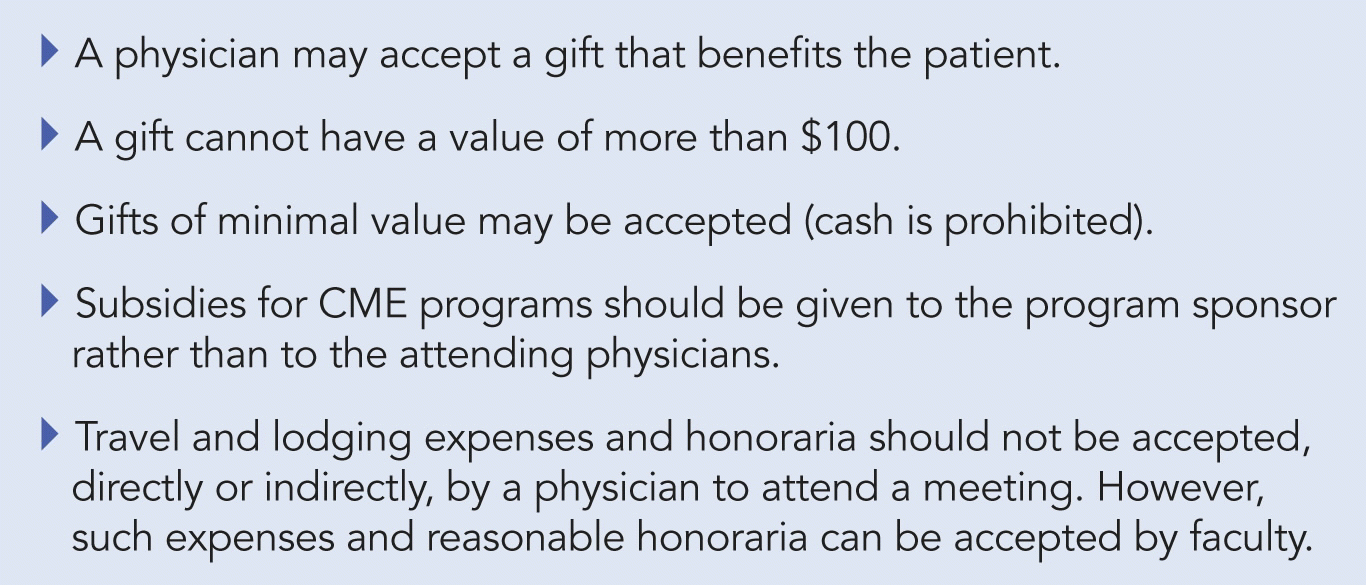CHICAGO-Under intense and growing scrutiny of relationships between industry and physicians, academic health centers, medical professional organizations, and physician practices are grappling with how to guide physicians in their dealings with industry. For a specialty such as otolaryngology-head and neck surgery, which is heavily dependent on medical devices, this issue is particularly important to address.
As we are a device-dependent specialty, the onus is especially on us as leaders in medicine to make sure we regulate our own house, said Udayan K. Shah, MD, Chair of the Medical Devices and Drugs Committee of the American Academy of Otolaryngology-Head and Neck Surgery (AAO-HNS) and a pediatric otolaryngologist-head and neck surgeon at Alfred I. DuPont Hospital for Children and Nemours Children’s Clinic-Wilmington in Delaware.
Speaking at a miniseminar on this topic at the recent AAO-HNS annual meeting, Dr. Shah emphasized the importance of physicians and institutions taking a proactive approach to compliance to protect physicians against liability issues, as well as to ensure their legitimate rights to compensation for services rendered.

Proactive Approach to Compliance
For Dr. Shah, who lectures widely on issues related to physician-industry relationships, full disclosure and transparency are the most important elements for physicians and institutions to keep in mind when dealing with industry. For any relationship that physicians have with companies, disclosure must be made within your institution, with your colleagues and peers, and with your patients, he said.
Another way to think of this, according to Gina Maisto Smith, JD, an attorney at Ballard Spahr Andrews & Ingersoll, LLP, in Philadelphia, is for physicians to treat a potential opportunity to work with industry as they would treat a patient-to triage the proposed relationship with industry with professionals who are familiar with the rules and regulations governing these relationships, such as an attorney or compliance officer.
Laying a sound foundation for a relationship with industry is critical, and, along with working with an attorney or compliance officer to ensure this, physicians can educate themselves about what issues to think about in dealing with industry.
According to Ms. Smith, there is a plethora of resources available for physicians and institutions on how to form a relationship with industry. The updated guidelines by the American Medical Association (AMA) are one essential resource (www.ama-assn.org/ama/pub/category/4263.html ) (see Table 1).
Another key source is the guidelines on compliance by the Office of Inspector General (OIG), an agency within the US Department of Health and Human Services (http://oig.hhs.gov/testimony/docs/2008/demske_testimony022708.pdf ).
According to Ms. Smith, the OIG also offers a hotline that physicians can use to ask for advice.
Ms. Smith recommends that physicians use these resources to educate themselves and to raise the right questions as they work with a compliance officer or attorney in establishing ties with industry.
Perception is Reality
For Gavin Setzen, MD, Chair-Elect of the Board of Governors (BOG) and Immediate Past-Chair of the Socioeconomic and Grassroots Committee of the AAO-HNS, as well as an otolaryngologist in private practice at Albany ENT and Allergy Services in Albany, NY, transparency is critical to, above all else, protecting the trust between physician and patient.
One has to be very careful about how these relationships [between physicians and industry] evolve, he said. I think from the patient’s perspective, there is a potential problem even if there is only the perception of an improper relationship.
To dispel any sense of impropriety, Dr. Setzen does not allow any products with logos of pharmaceutical or medical device companies in his private practice.
He also thinks that organized medicine-representing bodies, such as the AAO-HNS, must be free of any bias or inappropriate relationship in how it advertises itself and how it counsels its members.
Scrutiny and oversight are only going to become more intense, and to maintain professionalism and credibility as an organization or individual physician, I think one has to become more aware of these issues and develop a compliance program to ensure that physicians remain informed about and adhere to recommendations such as those proposed by the AMA, he said.
From a legal point of view, the importance of perception is also critical. According to Ms. Smith, there is a view in the enforcement community that any joint venture between a physician and medical device company, for example, in itself violates the antikickback law. The concern is that a physician’s financial stake in the profit of the device may influence his or her use of the device. Although this view can be rebutted, said Ms. Smith, it does indicate just how vulnerable physicians can be in these relationships.
To reduce the risk involved in forming these relationships, and any perception of impropriety, she emphasizes prevention as the key and encourages physicians to understand enough about the issues raised by these relationships to ask the right questions and seek help in the right places.
Other Issues to Consider
Along with transparency, other issues that need consideration when working with industry include retaining rights over data as well as adequate and fair compensation. I can’t say enough about how important it is for researchers and institutions to maintain rights over their research data, said Dr. Shah.
As part of this, Dr. Shah emphasized the obligation researchers have to publish negative studies. In general, it is considered anathema in academics to share negative data, he said, but you need to share bad news as well as good news.
Physicians also need to recognize what activities are appropriate for compensation, and what activities are not. For work done that adds value to, for example, developing a medical device or training physicians on how to use an instrument, compensation is valid. The task here is for the physician to determine what is fair market value for his or her services. Dr. Shah, who is a consultant for two competing medical device companies, estimates an hourly fee for his services.
Overall, physicians are urged to become familiar with the AMA guidelines as well as confer with a compliance officer or attorney when working through the details of compensation or any of the other issues pertaining to working with industry.
Additional Resources
Shah UK, Smith GM, Ziv BE, Reilly JS. A warning to physicians: changing landscape of the corporate-provider relationship. Otolaryngol Head Neck Surg 2008;138:697-9.
Shah UK, Smith GM, Devaiah A, et al. Corporate-physician relationships: a need for education. Otolaryngol Head Neck Surg Accepted for publication Oct. 16, 2008.
©2009 The Triological Society

Leave a Reply